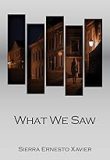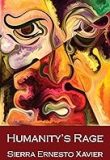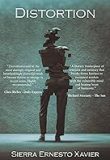Author Interview:
Sierra Ernesto Xavier
The books shown on the left are by Sierra Ernesto Xavier. Click on the cover to order.
This interview was conducted by Lisa Brown Gilbert on October 25, 2024.
Lisa Brown-Gilbert: In general, what started you on your journey as a writer?
Sierra Ernesto Xavier: I loved reading and got excited by certain styles of writing. My mind overflows with ideas and admiration for those who can put pen to paper. When I get passionate about something I want to write it down. I also have a need to express things in my own way and writing allows you to do that.
Lisa Brown-Gilbert: Distortion is such a fascinating story, what made you choose the premise and style of the book?
Sierra Ernesto Xavier: Distortion was a challenge posed to me following my previous book, The Malady of Love. Malady is a book purely of the interior that focusses on emotion and psychology of a couple with trauma (one has Selective Mutism and the other survivor’s guilt of losing a twin whilst in uterine). It posed the question of how a person overcomes their trauma in order to find a relationship, only to discover that their partner has a trauma of their own. In many respects this is relatable to all, as we all have our histories and need to cater for our partners in order to make it successful.
The challenge therefore was not to write a book purely on emotion and psychology but about the physical, hence the premise of two people with various differences. To also describe a lot of the inner world in physical terms.
Both books are minimalist and strip out other characters, and scenes, so as to focus on what is being said by the couple. It draws the reader into their world. Whilst in Malady one could write to some degree with musicality (the sound and rhythm) in the text, when you focus on the physical this is not possible. You have to use the visual in your creativity.
Lisa Brown-Gilbert: What drew you to titling the book Distortion?
Sierra Ernesto Xavier: It was never about describing the characters as distorted: it is all about perception. Do these characters see themselves as distorted, does society see them as distorted or have their perceptions changed because they absorbed what society believes of them?
This is clear in the first chapter as each of them see themselves as imperfect by find a partner whom they see as perfect. It is about unravelling what perception is the truth.
I also finally ask the question that when you experience the onslaught of the world how can you perceive what the truth is. Because of this experience is the truth distorted?
Lisa Brown-Gilbert: How did you decide on your characters and their unusual physical, psychological and mental dispositions?
Sierra Ernesto Xavier: Once the challenge was there about the physical focus, it was a matter of selection to see what physical difference I could use. A documentary availed to me a bodily difference of Scoliosis. And rather than having another bodily difference, I chose the other to have a facial difference. Even though I was aware of Harry Tonks’ pictures of World War I soldiers with horrendous facial injuries, I wanted to ensure that these differences were congenital, purely because it adds so much more early years psychology material.
Lisa Brown-Gilbert: Would you share some of your process while writing Distortion?
Sierra Ernesto Xavier: Once I had the concept I would research the physical element to it, outline what they would look like. Then understand the background issues – who experience what. I had some idea of where the characters will end up but the journey evolved as I started to write. The creativity would come to me in quiet moments. I would constantly re-write and revise my work as I moved along.
Lisa Brown-Gilbert: What would you say was the biggest challenge to writing Distortion?
Sierra Ernesto Xavier: How do you write a dialogue only novel which focuses on the physical? I could not just say in a description that he was tall or she had blonde hair, because that would have broken the dialogue only constraint I was working with. Hence the first chapter is the couple talking about each other (their physical selves) and the reader has to piece the puzzle together of what they look like. The emotional catharsis is represented in a physical way – the unravelling and removal of emotional layers through their enactments. The biggest challenge was intimacy – one cannot talk your way through intimacy – so I had to think about how best to overcome that.
The reader will hopefully see the level of creativity that has been used in each chapter as I address various issue with my own literary restrictions.
Lisa Brown-Gilbert: How much research went in your characters with such specific disfigurements?
Sierra Ernesto Xavier: There was quite a lot of background work, which I list at the back of the novel. Not just to understand what the physical issues were, but how they impact the individual, physical, emotionally and psychologically. One has to understand both how society treats those with differences and how the medical profession is involved.
I also looked into how one may overcome the physical distrust in order to be with someone. Here I read about Sensate Focus Therapy – a journey towards intimacy – the ability to trust yourself and your partner and overcome any fears.
Lisa Brown-Gilbert: If you were to meet your characters in real life, how would you react to them?
Sierra Ernesto Xavier: I would smile and befriend them, as I would know what they have gone through.
Lisa Brown-Gilbert: What advice would you share with potential authors looking to publish?
Sierra Ernesto Xavier: Write what you are passionate about. Write what you believe in. Do not be afraid of getting feedback. Do not be afraid of resetting. Get pre-publication assessment, feedback and journalistic reviews: it will help pitching at agents and publishers
Lisa Brown-Gilbert: Do you have any current projects you are working on?
Sierra Ernesto Xavier: Yes, I am trying to write a short horror story that will form a part of my “What We…” series. So far, What We Saw and what I am currently writing has no dialogue whatsoever!! … Another type of challenge.
Lisa Brown Gilbert: Thank you for agreeing to do this interview with me.
Ⓒ 2022 BestSellersWorld.com | All Rights Reserved | Design + Development by The Unglitch




